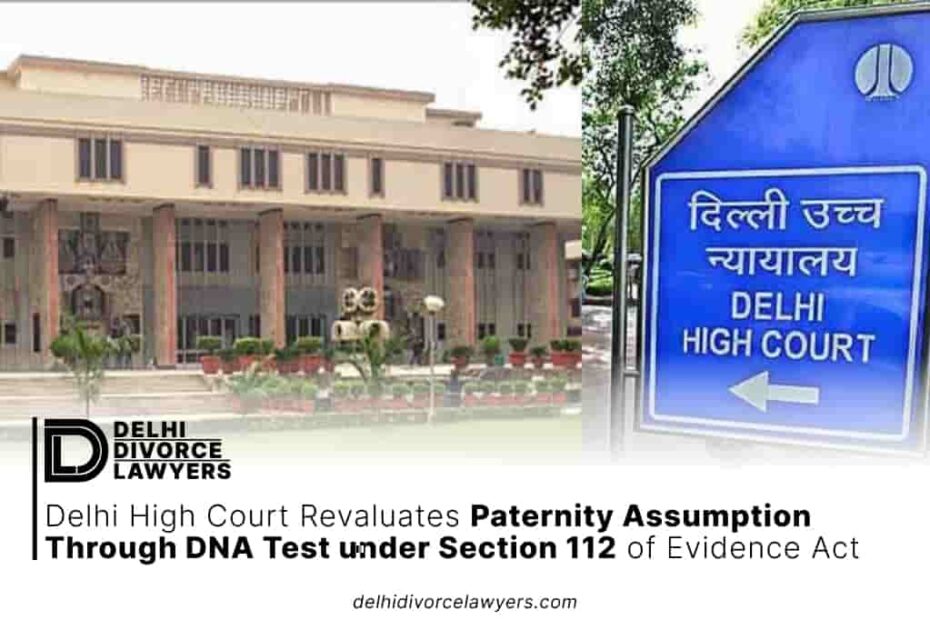Section 112 of the Evidence Act underscores the principle that children born within the confines of a legally recognized marriage are deemed legitimate per se and it ensures that no unwarranted assumptions of impropriety or moral transgressions are made and instead places the burden of proof on those who contest the child’s legitimacy.
In the Delhi High Court, a petition was presented invoking Section 482 of the Criminal Procedure Code, seeking the quashing of a judgment dated 20-03-2019 rendered by the District and Sessions Judge of the South-East District, Saket, Delhi, in connection with a criminal appeal. This appeal upheld the ruling issued by the Metropolitan Magistrate of Saket, Delhi. The Honorable Justice Swarana Kanta Sharma, in upholding the impugned order, held that in light of the DNA report available as evidence, the first respondent could not be held liable for providing maintenance to the child, even though the child’s birth occurred during the continuance of the petitioner’s marriage with the first respondent.
The petitioner, formerly employed as a domestic help at the respondents’ residence for a duration of three years, spanning from February 2013 to February 2016, asserted that during this tenure, the first respondent had made unwelcome sexual advances and maintained regular sexual relations under the promise of marriage. Furthermore, it was alleged that the petitioner was coerced into engaging in sexual acts with two of the first respondent’s acquaintances, and these encounters occurred when the petitioner initially refused such demands. The petitioner’s compliance with these demands was reportedly a result of threats made by the first respondent regarding marriage.
Subsequently, on 02-03-2016, the petitioner and the first respondent solemnized their marriage, and astonishingly, on 01-04-2016, a child was born to the petitioner, which was less than one month after the marriage. On 14-07-2016, the petitioner initiated legal proceedings under Section 12 of the Protection of Women from Domestic Violence Act, 2005 (DV Act) against the respondents, and along with this legal action, submitted an income affidavit and a request for interim maintenance. On 19-01-2017, the respondents responded to the petition and concurrently sought a DNA test to determine the child’s parentage, which was granted. Nevertheless, the Magistrate denied the maintenance claim, citing income concealment as the reason. Subsequently, an appeal was lodged with the Sessions Court, challenging this decision. Consequently, the petitioner sought to quash the orders of the Magistrate and the Sessions Court, dated 01-12-2017 and 20-03-2019, respectively.
Addressing the application of the presumption under Section 112 of the Evidence Act, the petitioner asserted that it should apply to a child born within the confines of a legal marriage. The court observed that Section 112 of the Evidence Act merely necessitated the establishment of a valid marriage between the child’s mother and another individual to establish conclusive proof of the child’s legitimacy concerning the person to whom the mother was married. Notably, Section 112 of the Evidence Act itself permits a restricted exception to this presumption, specifically in cases of non-access. Therefore, the sole permissible avenue to challenge the otherwise unassailable presumption under Section 112 is by demonstrating non-access.
With respect to the use of a DNA test to challenge the presumption under Section 112 of the Evidence Act, the court underscored that the burden of demonstrating non-access rests upon the party making the assertion. The evidence presented must be substantial, unambiguous, persuasive, and definitive, surpassing the threshold of a mere preponderance of probabilities. It was explicitly stated that an adequate yet insufficient explanation would not suffice. Instead, the evidence must meet the exacting standard of being “proved,” as outlined in Section 3 of the Act.
The court acknowledged that the DNA test had been conducted by judicial order, which had not been contested. The DNA test report ultimately concluded that the first respondent was not the biological father of the petitioner’s child. Consequently, the protection offered under Section 112 of the Act would have been applicable only if the DNA test had not been conducted. It was emphasized that the legislative intent behind the enactment of Section 112 of the Evidence Act was to safeguard every child from being considered “illegitimate” and to provide the child with the protection of legitimacy by invoking the presumption under Section 112 in favor of the child’s legitimacy when born during the existence of a valid marriage.
The court ruled that the first respondent was not the biological father of the petitioner’s child, resulting in the denial of child maintenance. However, as the existence of the marriage between the parties was not disputed (though its validity was contested and subject to adjudication in the relevant court of law), the court determined that the trial court had erred in denying maintenance to the petitioner at that stage. Consequently, the case was remanded for a fresh assessment of the maintenance amount to be awarded to the petitioner.

